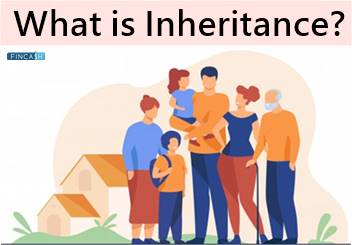
Table of Contents
What is Inheritance?
Inheritance is the passing of worldly things to loved ones by the ancestors in the event of death. Following the estate owner’s death, all or a portion of the estate's assets are handed to the heirs.

The inheritance might be in the form of cash, Real Estate, stocks, or other assets. The estate owner usually creates a will specifying how the assets will be transferred to the, and it is only enforceable when the individual passes away.
In some instances, the owner of an estate may pass away without leaving a will. This makes finding the estate's legitimate heirs more difficult. These estates are dispersed according to the regulations that govern inheritance distribution to descendants in each state.
How Does Inheritance Work?
When a person dies without a living spouse, the estate is passed down to the generations. Inheritance is regarded as a financial gift to new generations by the deceased.
Asset distribution is decided throughout the estate planning process when wills are prepared, and heirs or beneficiaries are named. In a will, all specifications of asset distribution are listed. A simple list of recipients may be used to divide everything equitably. If particular objects are bequeathed to specific persons, the will must state so.
A will must be probated before the inheritance process can begin. The probate court examines the will, appoints an executor, and officially distributes assets to the named beneficiaries.
When wills are not prepared by the deceased, a probate court must intervene to give justice to the dead person’s property if the issue is not settled calmly within the family. The probate court investigates whether the person has listed any beneficiary or not in the matters of assets. Property, like real estate, jewels, heirlooms, and other valuables, might be more difficult to divide. The court designates an administrator to act as the executor and distribute the assets after forming the plan. The settlement of this procedure might take months or even years.
Talk to our investment specialist
Process of Inheritance Distribution
The steps through which inheritance is distributed legally are as follows:
The way assets will be dispersed to a dead person's descendants is determined in the first step. During this procedure, the owner determines who is entitled to a share of the bequest among their heirs. All of the assets owned by the owner are listed. In the list of assets, the will defines who gets what.
The will must first be presented to a probate court before the inheritance procedure can begin. The probate court is responsible for enforcing the distribution of the deceased's assets in accordance with the deceased's desires as expressed in the will.
Then the court starts the procedure by giving permission to the will’s executor to lawfully transfer the money to the named beneficiaries. Prior to making distributions to beneficiaries, any obligations due by the dead to creditors, investors, or the government must be paid.
Restrictions on Inheritance
There can be certain restrictions levied on the will by the owner, like who gets paid, how much they are paid, how the inheritance can be utilised and so on. A few restrictions are jotted down to make better understanding:
- Restriction on the usage of funds is the first restriction on inheritance. Funds can only be given to beneficiaries once they have reached 18+ age or have met specified milestones, such as graduation from college or marriage.
- Allocation of funds to recipients is another constraint. To avoid the risk of misappropriation of an inheritance, a person may ask that the bequest be paid out in small installments rather than in one lump sum payment to designated beneficiaries.
- Restriction on how an inheritance is spent is another one to be considered. The money may be restricted to specific needs, such as medical expenditures, education, maintenance, and so on.
The Bottom Line
Having a huge inheritance isn't always a guarantee of financial security. It's quite simple to waste a fortune if you don't have a strategy. The unexpected influx of cash might lead to lifestyle Inflation and foolish conduct.
Beneficiaries are often in worse financial situations after receiving an inheritance than they were before receiving it. In case you’re going to inherit a huge sum of money, be realistic about how much you'll get, examine your present financial condition, think about your goals, set limitations, and spend carefully. And your top priority should be debt reduction and investment.
All efforts have been made to ensure the information provided here is accurate. However, no guarantees are made regarding correctness of data. Please verify with scheme information document before making any investment.




